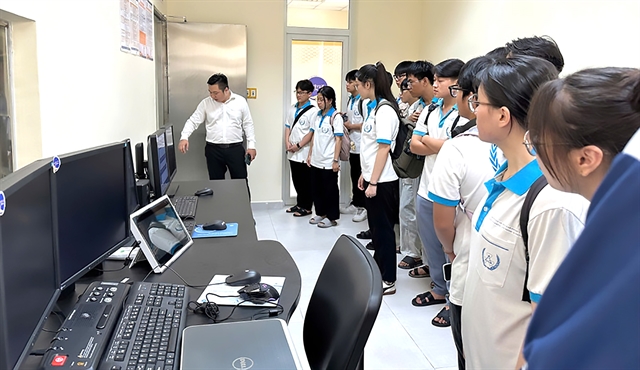 Society
Society

 |
| Students from a Nuclear Physics class of the University of Science (Việt Nam National University–HCM City) visit nuclear medicine equipment at a hospital. — Photo courtesy of the university |
HCM CITY — Việt Nam needs nuclear experts and managers with extensive and practical experience to ensure high safety standards as the country reinitiates its nuclear energy projects, according to experts.
Associate Professor Dr Nguyễn Ngọc Lâm, executive committee member of HCM City Automation Association, who has a wealth of experience in nuclear personnel training in Việt Nam, explained that nuclear energy consists of two technologies: nuclear technology and power generation technology.
Therefore, human resources training for the nuclear energy sector in Việt Nam must include training for reactor operation and power system operation.
For many years, Việt Nam has been training electrical engineers domestically or sending them to study abroad, and is fully capable of providing the necessary workforce for power system operations with the development of renewable energy under Việt Nam's Eighth National Power Development Plan (PDP8), said Lâm.
However, autonomy in nuclear power development is a major challenge for the country. To independently develop a nuclear reactor, Việt Nam would need to master key technologies such as uranium ore processing, fuel rod manufacturing, reactor design and the technology to convert nuclear energy with turbines.
Việt Nam’s uranium ore reserves are considered moderate by global standards. According to data published in Tạp chí Địa chất (Geological Journal) No 307 (2008), the country has over 200,000 tonnes of triuranium octoxide, a compound of uranium.
For reference, the designed capacity of the two reactor units proposed in the Ninh Thuận Nuclear Power Project was 2,000MWe, which would require 12,000 tonnes of triuranium octoxide over 24 years of operation.
"However, developing uranium enrichment technology is difficult because Việt Nam lacks the necessary domestic capabilities, and is constrained by the Treaty on the Non-Proliferation of Nuclear Weapons,” Lâm explained.
Therefore, the immediate focus in mastering nuclear power technology should be placed on operating existing reactors, with human resources being the critical factor, he said.
According to Associate Professor Dr Trần Thiện Thanh, vice dean of the Faculty of Physics – Engineering Physics at the University of Science (under Việt Nam National University–HCM City), human resources are foundational for safe establishment and operation in the nuclear energy sector.
This includes basic research and technical applications to large-scale projects, such as the planned nuclear science and technology centre in Đồng Nai Province and the proposed nuclear power plant in Ninh Thuận Province.
While the education sector has been working on various projects to upgrade the educational infrastructure and training quality, Thanh observed that the quantity and quality of trained professionals still fall short of actual demand.
Moreover, enrolment in nuclear physics and nuclear engineering remains low due to a lack of incentives.
Proposing strategic directions and solutions to enhance workforce training, Thanh emphasised the need to develop and update interdisciplinary training programmes that not only serve nuclear power but also related fields, such as environmental science, materials analysis, and the applications of artificial intelligence.
Additionally, he recommended involving nuclear energy professionals in international projects of the International Atomic Energy Agency (IAEA), including strategic planning courses for sustainable nuclear energy development.
Another suggestion is to expand exchange programmes for students, interns and researchers with countries that have advanced nuclear sectors.
Training could follow a contract-based model, with scholarships and job commitments after graduation, he added.
Thanh also recommended that authorities and governance agencies accelerate investment in facilities, equipment and laboratories, in addition to strengthening the teaching and research staff at domestic institutions.
“There needs to be dedicated funding for undergraduate and postgraduate training at institutions related to nuclear energy,” he said, calling for a strategic human resource development plan by translating the national roadmap for nuclear energy development into specific, annual targets and milestones. — VNS




